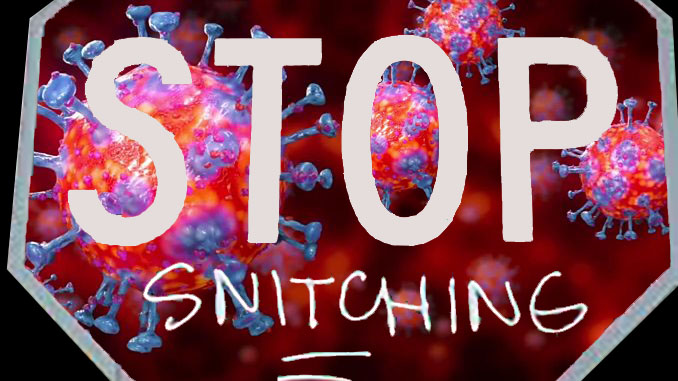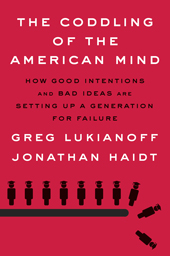
By S.T. Patrick
A widely circulating YouTube video shows an unhinged woman screaming at a young adult as she stands next to the driver-side window of his car. “You’re supposed to be quarantining! The state has a stay-at-home order! I’m calling the cops! Wait until the cops get you!” If America is turning into a “Snitch State” as the restrictions on public movement increase, politicians such as Los Angeles Mayor Eric Garcetti are encouraging the trend.
Los Angeles, America’s second-largest city, has been on a “safer-at-home” order for over a month. All non-essential businesses have been closed, and residents were ordered to stay home. Last week, Garcetti went so far as to encourage snitching among residents.
“If any non-essential businesses continue to operate in violation of the stay-at-home order, we’re going to act to enforce the safer-at-home order and ensure their compliance,” Garcetti said. “You know the old expression about snitches. Well, in this case, snitches get rewards. . . . We want to thank you for turning folks in and making sure we are all safe.”
Snitching, therefore, is for the public good. It “keeps people safe,” the government will continue to say. The world has seen this before and in the not-too-distant past.
Buried behind the hottest edge of the Cold War Iron Curtain was communist-controlled East Germany. The Stasi, the feared East German Ministry for State Security, was fueled by an enormous network of neighborhood spies: employers reporting employees, neighbors reporting neighbors, children reporting classmates, and family members reporting other family members. There were a variety of reasons why countrymen turned on one another, knowing that doing so would bring stricter surveillance and potential punishment from the state. In the end, dutiful East Germans did not believe anyone should receive one iota of freedom more than the state was allowing to them. It was jealousy and insecurity, as usual in situations like these, mixed with a bit of Stockholm Syndrome (the idea that captives, over time, identify with and have empathy for their captors).
Police in some cities have already started enforcing what are more like stay-at-home suggestions rather than laws. Calling them “orders” doesn’t add enforcement powers. Until legal enforcement can be attached via legislation, these “orders” are mere suggestions. Yet, in Brighton, Colo., a former police officer was arrested for playing ball in a park with his six-year-old daughter. In Morgantown, W.V., a woman was arrested for having 10 people at a house party. The governor had restricted gatherings to a maximum of five people.
New York City Mayor Bill de Blasio has threatened his city’s residents with fines. “Fines will be given if warnings are given and folks are told, ‘If you don’t disperse, we’re going to start fining you,’ ” de Blasio said. “So, our officers have to be urgent about it.” Some who have not dispersed have been fined. Others were arrested and charged with obstructing governmental administration, unlawful assembly, and disorderly conduct. A British tourist was arrested for swimming in a hotel pool. As the officer arrests her, a woman off-camera screams, “She deserves that!” This, despite the fact that the Pool Water Treatment and Advisory Group (PWTAG) has said that pools are very safe environments right now due to the high level of both chlorine and water, which kill coronavirus. How were the police notified? Another traveler staying at the hotel called it in.

Critics of “See Something, Say Something,” a program that has existed since 2003, say that the idea itself creates a culture of unjust targeting, as not all suspicious behavior is created equally. It also allows false calls to come in at higher rates when neighbors can anonymously report on personal enemies (a current problem dealt with often in state child protective service departments).
Systematic snitching gives everyone a role in a police state. Americans in the new millennium had already begun questioning whether the militarization of their local police forces had gone too far, if the push for mass incarceration in the 1980s and 1990s had created an untenable and expensive police state in what is supposedly one of the world’s freest countries. Some have even questioned the infringement on privacy of Neighborhood Watch programs and Homeowners Associations. There are already signs that a post-Covid-19 world is one willing to encourage the act of snitching. The more we are pushed into despair by authoritarians above us, the more it seems we will turn on one another, thus inflating the surveillance society. This kind of behavior destroyed morale and prohibited many interpersonal relationships in East Germany from blossoming. Americans have time to change course and resist this before the same occurs here.
S.T. Patrick holds degrees in both journalism and social studies education. He spent 10 years as an educator and now hosts the “Midnight Writer News Show.” His email is [email protected]. He is also an occasional contributor to TBR history magazine and the current managing editor of Deep Truth Journal (DTJ), a new conspiracy-focused publication available from the AFP Online Store.






All true , but I would think you’d be more truthful and less open to suggestions of political partisanship , if the author used an example of Hitler’s Germany as well ,not just that of East (Soviet) Germany.